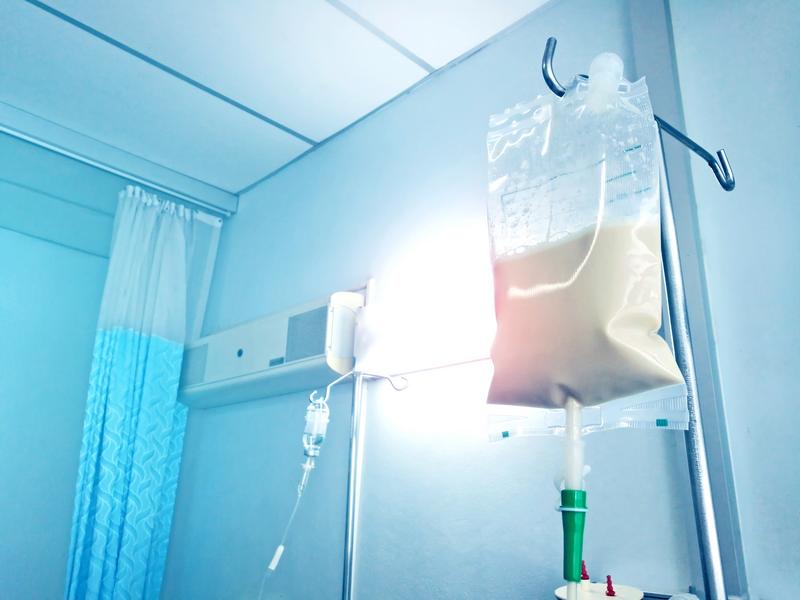Parenteral nutrition
If tube feeding is not possible, necessary nutrients can be administered via an intravenous infusion.

Total Parenteral Nutrition (TPN) is a complex matter that is not without risks. Even more so than with enteral nutrition, it is important that the food administered is balanced to cover all nutritional needs. Moreover, the administration must be done safely, since an intravenous access route is much more invasive than an enteral tube.
The preparation of parenteral nutrition is done in aseptic conditions in a hospital pharmacy. In the past, preparation was customized: different components were mixed and collected in bags for delivery to the patient's home. Nowadays, industrially prepared mixtures (prefab) are often used, which require less manipulation and are also cheaper.
A somewhat unusual situation is the parenteral 'supplementary nutrition' that certain patients receive during kidney dialysis. First of all, it provides an additional input of protein and calories, on which the patient is therefore not completely dependent.
What are the conditions for refund?
The health insurance provides reimbursement for parenteral nutrition for patients with one of the pathologies below.
Parental nutrition regulations (KB 20 July 2007)
Amount
The amount of the refund depends on :
- the age of the patient;
- and the nature of the food.
| Refund | |
|---|---|
| Bags 'tailor-made' for children up to 17 years old | 83 euros |
| Bags 'made to measure' for adults | 75 euros |
| Industrial pre-mixtures to which minerals and/or vitamins may or may not be added | 60 euros |
| Bags 'per dialysis' | 35 euros |
| Administration of electrolytes per day without administration of parenteral nutrition | 30 euros |
This amount covers the entire composition of the bags (with the exception of separately reimbursable pharmaceutical specialties), the costs of preparation and the costs of administration equipment (with the exception of the pump and the perfusion stand).
The patient himself pays 0.62 euros per day .
The hospital settles the flat rates directly with CM.
Important:
There is a daily allowance for the administration of electrolytes , per day that no parenteral nutrition is administered. Parenteral nutrition contains fluid, macronutrients (glucose, fat, amino acids), electrolytes (Na, K, P, Ca, Mg, Cl, etc.) and micronutrients (vitamins and trace elements). Depending on the severity and cause of the intestinal failure, there may be an imbalance between the need for macronutrients on the one hand and fluids and electrolytes on the other. In some patients, macronutrients no longer need to be administered daily, but there is a daily need for fluids and electrolytes.
What is the procedure?
The reimbursement is subject to the approval of the consulting physician . This agreement is valid for twelve months and can be extended for a maximum of five years.
The application for reimbursement is made with a detailed report and a standard form completed by a medical specialist who collaborates with a multidisciplinary hospital team that has experience with parenteral nutrition.

